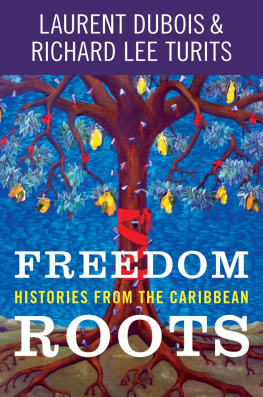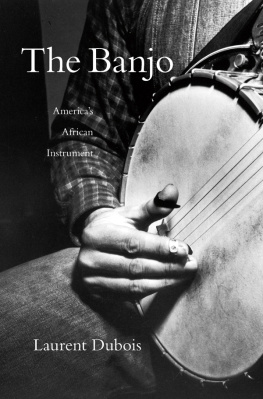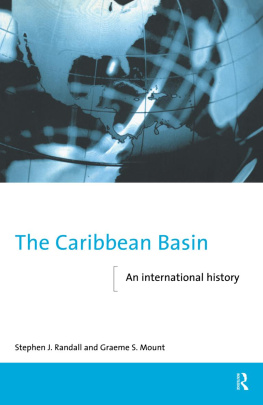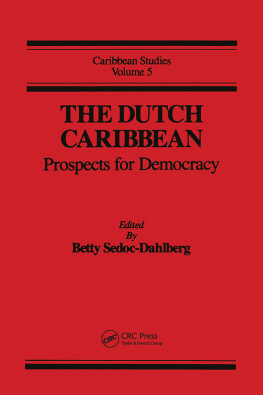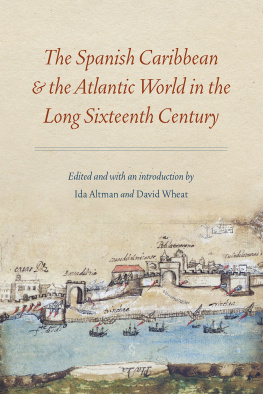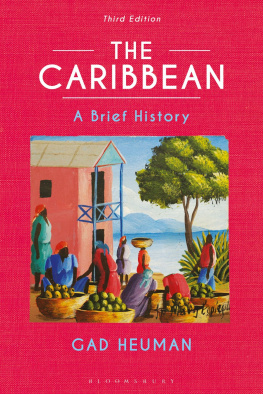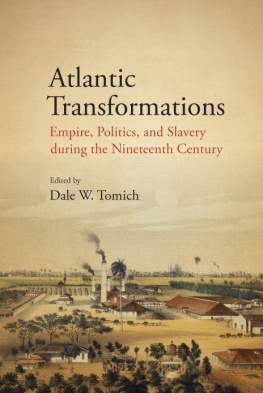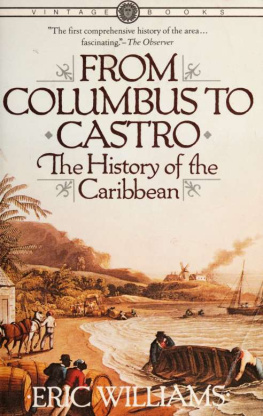Publication of this book was made possible by the generous support of the Deans Office and the History Department of the College of William & Mary.
2019 The University of North Carolina Press
All rights reserved
Set in Charis and Lato by Westchester Publishing Services
Manufactured in the United States of America
The University of North Carolina Press has been a member of the Green Press Initiative since 2003.
Library of Congress Cataloging-in-Publication Data
Names: Dubois, Laurent, 1971author. | Turits, Richard Lee, author.
Title: Freedom roots : histories from the Caribbean / Laurent Dubois and Richard Lee Turits.
Description: Chapel Hill : University of North Carolina Press, [2019] | Includes bibliographical references and index.
Identifiers: LCCN 2019012190 | ISBN 9781469653600 (cloth : alk. paper) | ISBN 9781469653617 (ebook)
Subjects: LCSH: Caribbean AreaHistory. | Caribbean AreaForeign relations. | Caribbean AreaSocial conditions. | Caribbean AreaPolitics and government.
Classification: LCC F1621 .D83 2019 | DDC 972.9dc23 LC record available at https://lccn.loc.gov/2019012190
Jacket illustration: Edouard Duval-Carri, Larbre allume (1991, oil on canvas). Used by permission of the artist.
Introduction
Caribbean Pasts
To tell the history of the Caribbean is to tell the history of the world. For centuries the region has remained at the center of global transformations, at once a crossroads and a crucible for their unfolding. The Caribbean is a region deeply shaped and in enduring ways dominated by European and U.S. imperial projects, which across time and space have focused on implanting and sustaining extractive and exploitative systems of plantation agriculture. But the Caribbean is also a place where subjected peoples have never ceased, even under the most severe duress, contesting, imagining, and reinventing their worlds, creating rich cultural and political alternatives to those offered by imperial rule. In this book, we follow a particular itinerary though the history of these archipelagos by foregrounding the question of land. Through this optic, we tell the story of the construction of race and slavery, struggles over the meaning of freedom and sovereignty, and the invention of new practices and ways of life that sought to sustain autonomy within.
The Caribbean has experienced a particularly long period of colonialism, with virtually all of its populations having lived under three hundred years of colonial rule and many of them over four or even five centuries. This has created a region of remarkable complexity and diversity. As historian B. W. Higman notes, the islands of the contemporary Caribbean are home to 24 distinct polities, one more than the total on the continental landmass. Thirteen of these are today sovereign nations, the others occupying a cascade of political forms of constrained autonomy linking them to European countries or the United States. We focus on the island Caribbean rather than the greater Caribbean, which includes a broader region stretching from North America to Central and South America.
Above all, we position the question of landof how it is used, imagined, and contested in struggles for autonomy or wealthas a centerpiece and continuing thread. From the beginnings of European colonization in the Caribbean in the late fifteenth century to the present day, those with economic means and political power have overseen the creation of plantation systems that relied on massive labor forcesfor centuries, enslaved peopleto produce goods for export from the region. Yet the populations of the Caribbean have also always generated and pursued alternative projects aimed at using the land as the foundation for economic autonomy and national independence. The meaning given to land by colonial administrators and planters was radically different from that given to land by enslaved people and those who, for generations after emancipation, sought to root their legal freedom in forms of economic and social autonomy at odds with planters interest in labor exploitation. In histories from the Caribbean, we see the truth of historian Nigel Bollands view that land is itself a complex category, not just a geophysical determinant of social life but something that is itself socially produced and defined.
The Haitian writer Jean Casimir calls this matrix of alternative cultural, political, and economic structures and practices the counter-plantation system. Building on Casimirs ideas, ngel Quintero Rivera urges us to think of the history of the Caribbean in terms of a dialectical contradiction between plantation and counter-plantation, and between slavery and escape. This constant struggle between longings for freedom and the realities imposed by empire and the plantation formed, he writes, the shared skeleton of Caribbean culture, though the relative weights of and relationship between plantation and counter-plantation structures have varied over time and place.
Some communities in the Caribbean were overwhelmingly defined by plantation logics and forces, others defined by a counterpoint between the plantation and counter-plantation. Still others became counter-plantation societies, as was the case for Spanish Santo Domingo after the sixteenth century and Haiti after 1804. Everywhere in the Caribbean, however, forms of the counter-plantation have existed in different ways, offering sanctuary and possibility to individuals and communities, and often supporting political movements seeking broader transformation. The history of the confrontation between and entanglement of these different projects, one that sees land primarily through the lens of extraction and the other as a means to autonomy for communities and individuals, is key to understanding the Caribbean past and its present.
Our book is rooted in the counter-plantation perspective. That perspective is that of the majority of the people who, from the period of slavery until the present day, have sought out spaces of freedom and autonomy for themselves in the midst of, and in many ways against, the dominant economic and political orders in which they lived. Though this has always been a resistant and insurgent perspective, struggling against powerful economic and political obstacles, we see it as the vital foundation for the crafting of better Caribbean futures. While our book accounts for the structures of colonialism and the plantation that have in many ways dominated Caribbean societies, we see our fundamental task as offering a history that does not accept the epistemologies of those systems and instead arises from the visions and practices of the regions majorities.
Conquest, the rise of the plantation, emancipation, overseas rule, revolution, and reform stretched out over many centuries. They were propelled by different imperial governments (Spanish, British, French, Dutch, Danish, and ultimately U.S.) in often far-apart historical periods and with diverse implications for indigenous-, African-, Asian-, and European-descended populations. While we touch on many parts of the Caribbean in this book, the chapters focus at times on particular regions and at other times specific nations, an approach that allows us to tell stories and analyze themes with a mixture of meaningful depth and illuminating breadth.

